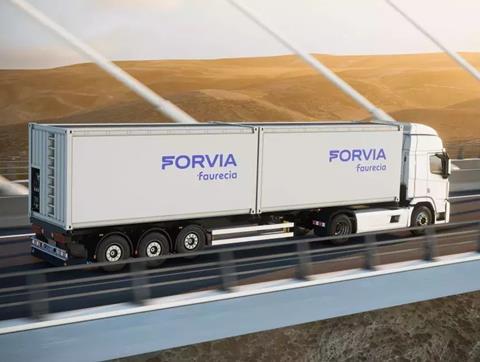
Forvia is the world’s seventh-largest automotive technology supplier and in the Americas region it moves more than 150,000 parts daily to support vehicle production across 55 operations, delivering to more than 20 customers. It employs a team of 80 logistics professionals across the region to work with its carriers, explains Ricardo Manzanera, transport director for Americas purchasing logistics at the company.
“Our focus is building strong relationships with our suppliers and logistics providers,” he says. “For example, we have a deep-trust approach with an approved panel of carriers that we do business with. These carriers have the right strategy, technology and a partnership mentality to support the seamless flow of parts.”
Track and trace tools
Another focus for Forvia is track and trace technology used to monitor the global flow of parts. As other automotive companies have experienced over the last few years, one of the main challenges the sector faces is unpredictable supply chain crises. Forvia’s track and trace technology allows it to quickly identify any disruptions or delays, according to Manzanera.
“We have been improving and modernising tools, allowing our centralised logistics traffic teams to better plan, execute and track deliveries across our factories in the Americas,” he says. “These tools include a digital inventory parts management system to automate inventory tracking, movements and transactions.”
Forvia is also deploying a transport management system (TMS) tool called Transportation Management Execution and Optimization (TEO) based on the SAP platform.
“We have centralised our traffic scheduling and material planning teams, allowing for end-to-end transport management, commercial harmonisation, and standardisation,” says Manzanera. “We are also deploying a modern TMS that allows our carriers to receive freight schedules in advance with detailed route specifications, enabling our carrier partners to plan, execute, and invoice in an orderly manner.”
Manzanera says that Forvia’s digitalisation and standardisation efforts help with the optimised delivery of finished parts to OEM customer locations.
“Our digital inventory parts management system at a factory level has allowed us to ensure accurate and real-time inventory tracking, reducing errors compared with a traditional, manual inventory management process,” he says. “This leads to more reliable delivery times. It also improves communication with our customers by providing precise updates on order status and availability.”

Information sharing
That improved communication with its transport and logistics providers includes daily operational reviews to ensure shipments are being executed as planned and to proactively communicate any potential disruptions, according to Manzanera. Forvia uses multiple information sources to manage disruptions in the supply chain including regional and global market intelligence reports. It has a global team dedicated to monitoring and assessing risk for overall operations. Forvia is also using tools such as Everstream Analytics, a supply chain management software, to help it spot potential bottlenecks and other risks.
Forvia has also launched an annual Carrier Day to share best practices and challenges, as well as quarterly meetings at which suppliers can discuss trending logistics topics.
The company has created a robust information-sharing network based on shared trust with its logistics providers and customers, according to Manzanera. “We are currently working on a supply chain network design initiative in North America and Europe to redesign how materials are moved into our factories and delivered to customers in more optimised, efficient ways,” he says. “This is a joint effort with our operations and purchasing functions, as well as with our panel of carriers and customers. We have achieved double-digit savings in millions of euros since the beginning of the project.”
Sustainable strategy
The company is also working with its transport partners on cutting down on emissions and has a target of achieving net zero CO2 emissions across the business by 2045.
“Sustainability is at the heart of our strategy – caring for our planet, conducting business in a responsible way and positively contributing to society,” says Manzanera. “In fact, in June 2022, Forvia became the first French company and the first global automotive company to receive a net-zero target approved by the Science Based Targets Initiative (SBTi).
In terms of training, Forvia is helping team members develop relevant skills through ongoing training and development. Forvia University is an online and in-person learning programme that supports the company in getting the right people in the right roles, as well as offering clear pathways for career growth within the organisation, according to Manzanera. “We welcome diverse, energetic and agile people who can thrive in a fast-changing environment and regularly seek out top talent through targeted recruitment efforts,” he adds.
